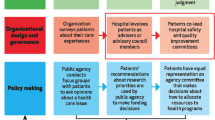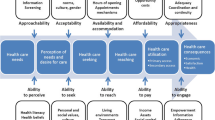Abstract
The FLOW program was designed to facilitate appropriate and safe transitions of patients from specialty mental health (SMH) to primary care (PC) as a method of improving access and reducing appointment burden on veterans who have improved or remitted. In this study, the team evaluated the implementation of FLOW across nine Veterans Affairs (VA) sites using a mixed-methods evaluation in a cluster-randomized stepped wedge trial design. Outcome assessments used data from VA databases, dashboards, and semi-structured interviews and were guided by the Reach, Adoption, Effectiveness, Implementation, and Maintenance (RE-AIM) framework. Across the sites, mean level reach was 1.36% of all specialty mental health patients transitioned to primary care (standard deviation [SD] = 1.05). Mean provider adoption was 10.2% (SD = 8.3%). Approximately 75% of veterans were fully satisfied with their transition and reported shared decision-making in the decision to transition. Rates of transitions did not decrease over the 6-month maintenance period following implementation. These data suggest that FLOW can be successfully implemented and maintained, although there was wide variation in implementation across sites. Future research should examine how to support sites that struggle with implementation.

Similar content being viewed by others
References
De Haan L, Linszen DH, Lenior ME, et al. Duration of untreated psychosis and outcome of schizophrenia: delay in intensive psychosocial treatment versus delay in treatment with antipsychotic medication. Schizophrenia Bulletin 2003;29(2):341–8. Available at: https://doi.org/10.1093/oxfordjournals.schbul.a007009. Accessed March 18, 2024.
Tondo L, Albert MJ, Baldessarini RJ. Suicide rates in relation to health care access in the United States: an ecological study. Journal of Clinical Psychiatry 2006;67(4):517–23. Available at: DOI: https://doi.org/10.4088/jcp.v67n0402. Accessed March 18, 2024.
Winefield HR, Turnbull DA, Seiboth C, et al. Evaluating a program of psychological interventions in primary health care: consumer distress, disability and service usage. Australian and New Zealand Journal of Public Health 2007;31(3):264–9. Available at: https://doi.org/10.1111/j.1467-842X.2007.00059.x. Accessed March 18, 2024.
Adolph M, Wu J, Feldman SR, et al. Who will take care of us? exploring differences in respondents’ satisfaction with primary care vs specialty care physicians. Health Outcomes Research in Medicine 2012;3(1):e3–10. Available at: https://doi.org/10.1016/j.ehrm.2011.10.002. Accessed March 18, 2024.
Williams ME, Latta J, Conversano P. Eliminating the wait for mental health services. The Journal of Behavioral Health Services & Research 2008;35:107–14. Available at: https://doi.org/10.1007/s11414-007-9091-1. Accessed March 18, 2024.
Whiteford HA, Harris MG, McKeon G, et al. Estimating remission from untreated major depression: a systematic review and meta-analysis. Psychological Medicine 2013;43(8):1569–85. Available at: https://doi.org/10.1017/S0033291712001717. Accessed March 18, 2024.
United States Department of Veterans Affairs. Department of Veterans Affairs FY 2018 - 2024 Strategic Plan. 2019. Available at: https://www.jcs.mil/Portals/36/Documents/Doctrine/Interorganizational_Documents/dva_strategicplan2018_2024.pdf?ver=2019-03-26-130258-840. Accessed March 18, 2024.
Fletcher TL, Johnson AL, Kim B, et al. Provider perspectives on a clinical demonstration project to transition patients with stable mental health conditions to primary care. Translational Behavioral Medicine 2021;11(1):161–71. Available at: https://doi.org/10.1093/tbm/ibz172. Accessed March 18, 2024.
Ritchie MJ, Dollar KM, Miller CJ, et al. Using Implementation Facilitation to Improve Healthcare (Version 3). Veterans Health Administration, Behavioral Health Quality Enhancement Research Initiative. 2020. Available at: https://www.queri.research.va.gov/tools/Facilitation-Manual.pdf. Accessed March 18, 2024.
Smith TL, Kim B, Benzer JK, et al. FLOW: Early results from a clinical demonstration project to improve the transition of patients with mental health disorders back to primary care. Psychological Services 2021;18(1):23. Available at: https://doi.org/10.1037/ser0000336. Accessed March 18, 2024.
Glasgow RE, Vogt TM, Boles SM. Evaluating the public health impact of health promotion interventions: the RE-AIM framework. American Journal of Public Health 1999; 89(9):1322–7. Available at: https://doi.org/10.2105/AJPH.89.9.1322. Accessed March 18, 2024.
Hundt NE, Yusuf Z, Amspoker AB, et al. Improving the transition of patients with mental health disorders back to primary care: A protocol for a partnered, mixed-methods, stepped-wedge implementation trial. Contemporary Clinical Trials 2021; 105: 106398. Available at: https://doi.org/10.1016/j.cct.2021.106398. Accessed March 18, 2024.
Brown CA, Lilford RJ. The stepped wedge trial design: a systematic review. BioMed Central Medical Research Methodology. 2006;6(1):1–9. Available at: https://doi.org/10.1186/1471-2288-6-54. Accessed March 18, 2024.
Hemming K, Taljaard M, McKenzie JE, et al. Reporting of stepped wedge cluster randomised trials: extension of the Consolidated Standards of Reporting Trials 2010 statement with explanation and elaboration. British Medical Journal 2018; 363. Available at: https://doi.org/10.1136/bmj.k1614. Accessed March 18, 2024.
Beebe J. Basic concepts and techniques of rapid appraisal. Human Organization 1995; 54(1):42–51. Available at: https://doi.org/10.17730/humo.54.1.k84tv883mr2756l3. Accessed March 18, 2024.
Bauer MS, Damschroder L, Hagedorn H, et al. An introduction to implementation science for the non-specialist. BMC Psychology 2015;3(1):1–2. Available at: https://doi.org/10.1186/s40359-015-0089-9. Accessed March 18, 2024.
Glasgow RE, Battaglia C, McCreight M, et al. Use of the reach, effectiveness, adoption, implementation, and maintenance framework to guide iterative adaptations: applications, lessons learned, and future directions. Frontiers in Health Services 2022; 2:959565. Available at: https://doi.org/10.3389/frhs.2022.959565. Accessed March 18, 2024.
Brunier A, Drysdale C. COVID-19 disrupting mental health services in most countries, World Health Organization survey. World Health Organization. 2020:2021–06. Available at: https://friends-project.eu/media/who_int_news_item_05_10_2020_covid_19_disrupting_mental_health_services_in_most_countries_who_survey.pdf. Accessed March 18, 2024.
Frogner BK, Dill JS. Tracking turnover among health care workers during the COVID-19 pandemic: a cross-sectional study. Journal of the American Medical Association Health Forum 2022; 3(4): e220371-e220371. Available at: https://doi:https://doi.org/10.1001/jamahealthforum.2022.037. Accessed March 18, 2024.
Vindegaard N, Benros ME. COVID-19 pandemic and mental health consequences: systematic review of the current evidence. Brain, Behavior, and Immunity 2020;89:531–42. Available at: https://doi.org/10.1016/j.bbi.2020.05.048. Accessed March 18, 2024.
Hundt NE, Kim B, Plasencia MP, et al. Factors associated with successful FLOW implementation to improve mental health access: a mixed-methods study. 2024. Accessed March 18, 2024.
Segal ZV, Pearson JL, Thase ME. Challenges in preventing relapse in major depression: report of a National Institute of Mental Health workshop on state of the science of relapse prevention in major depression. Journal of Affective Disorders 2003; 77(2):97–108. Available at: https://doi.org/10.1016/S0165-0327(02)00112-X. Accessed March 18, 2024.
Funding
Funding for this project is provided by VA QUERI PEC 19–302.
Author information
Authors and Affiliations
Corresponding author
Ethics declarations
Disclaimer
The views expressed in this article are those of the authors and not necessarily those of the Department of Veterans Affairs or the United States government.
Conflict of Interest
The authors declare no competing interests.
Additional information
Publisher's Note
Springer Nature remains neutral with regard to jurisdictional claims in published maps and institutional affiliations.
Herbert Nagamoto is retired.
Rights and permissions
About this article
Cite this article
Hundt, N.E., Plasencia, M., Amspoker, A.B. et al. Evaluation of the Implementation of the FLOW Program for Increasing Access to Mental Health Care. J Behav Health Serv Res 51, 325–337 (2024). https://doi.org/10.1007/s11414-024-09886-3
Accepted:
Published:
Issue Date:
DOI: https://doi.org/10.1007/s11414-024-09886-3




